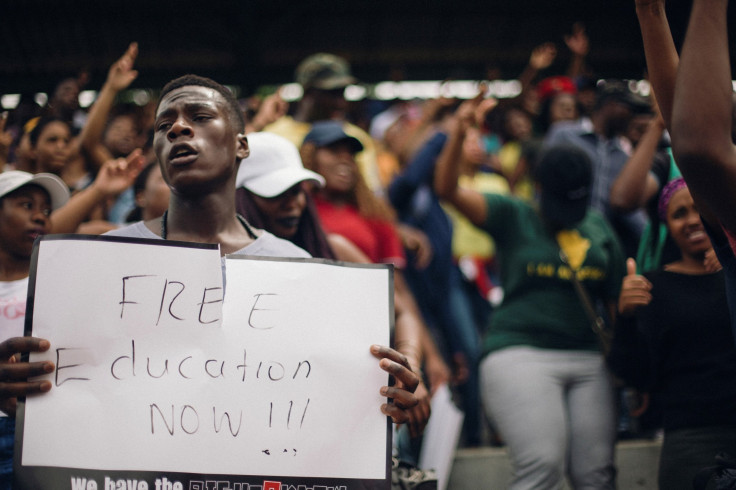South Africa Student Protests: 5 Facts To Know About The 'Fees Must Fall' Education Movement

South Africa saw some of its largest protests in two decades this week as hundreds of students faced off with police and school leaders to demand a cheaper college system. Activists affiliated with the "Fees Must Fall" movement clashed with authorities Monday at the University of the Witwatersrand in Johannesburg, where officials used tear gas to subdue rock-throwers, the Los Angeles Times reported. Demonstrations also raged at the University of the Free State in Bloemfontein and the University of KwaZulu-Natal in Durban, according to Al Jazeera.
The protests have inspired comparisons to apartheid, South Africa's segregation system that ended in the 1990s. But unless you read foreign newspapers, you might not have heard about the demonstration. Here are five facts to know about the revolt:
The protests are part of a larger campaign. "Fees Must Fall" began last year, when students fought back after the government proposed increasing tuition. The demonstrations worked — President Jacob Zuma ended up freezing the rates. Then, this year, the country announced administrators could hike their tuition up to 8 percent, according to BBC News.
Since October 2015 university students in South Africa have campaigned against high tuition fees #FeesMustFall pic.twitter.com/LyQdi1rDZd
— Al Jazeera English (@AJEnglish) October 11, 2016
Students want free education. The protesters argue that they can't afford tuition, which can reach about $5,000 annually, according to NPR. Apartheid may have formally ended, but the fees make attending university impossible for many black youth, Reuters reported. However, the schools say they can't pay for free education for everyone.
Protesters are also pushing for decolonized education, which involves implementing Africa-centric curriculum.
"The aftermath of apartheid has not been sufficiently dealt with. You are allowed to go around, but economic marginalization hasn’t changed much and opportunity certainly isn’t equal," student council representative Thalo Mokoena told the Guardian. "It’s no way as bad as it was, but there are parallels with back then."
Demonstrations have grown violent. Over the past month, students have set buildings on fire, hid bombs and shut down entire campuses in pursuit of their goals, Business Day reported. They have closed down roads and lobbed stones at officers, who returned fire with rubber bullets.
A priest, the Rev. Graeme Pugin, had to be hospitalized after a rubber bullet hit him in the face, iAfrica reported.
Multiple institutions were forced to suspend classes. Universities have been open off and on for the past three weeks as a result of the uncontrollable protests. "We have made this concession because we do not want the scenes that played out on our university campuses to be repeated," the University of Witwatersrand said last week, according to Anadolu Agency.
This has caused concern for students attempting to graduate on time or earn work experience.
Police surround peaceful students. Most move away. Throw stun grenade and sergeant shouts to arrest them students #FeesMustFall #wits pic.twitter.com/XqsclVRWfi
— Jameel (@indie_impimpi) October 4, 2016
The government is taking notice. Zuma announced Tuesday that he was putting together a task force to look into the problem, according to All Africa. He added that everyone — students, parents and other leaders — should work with the force "to ensure that the future of our children is not jeopardized."
© Copyright IBTimes 2025. All rights reserved.






















